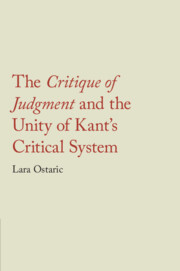Book contents
- The Critique of Judgment and the Unity of Kant’s Critical System
- The Critique of Judgment and the Unity of Kant’s Critical System
- Copyright page
- Contents
- Acknowledgments
- Note on Sources
- Kant’s Writings by Abbreviations Used for German Titles with Corresponding Translations
- Introduction
- Part I The Highest Good and the Postulates
- Chapter 1 Kant’s Justification of the “Fact of Reason” and the Objective Reality of Freedom from a “Practical Point of View”
- Chapter 2 The Highest Good and the Realism of Moral Glaube
- Chapter 3 Reflective Judgment and the Realism of the “Moral Image”
- Part II Aesthetic Judgment and the “Moral Image”
- Part III Teleological Judgment and the “Moral Image”
- Bibliography
- Index
Chapter 1 - Kant’s Justification of the “Fact of Reason” and the Objective Reality of Freedom from a “Practical Point of View”
from Part I - The Highest Good and the Postulates
Published online by Cambridge University Press: 15 August 2023
- The Critique of Judgment and the Unity of Kant’s Critical System
- The Critique of Judgment and the Unity of Kant’s Critical System
- Copyright page
- Contents
- Acknowledgments
- Note on Sources
- Kant’s Writings by Abbreviations Used for German Titles with Corresponding Translations
- Introduction
- Part I The Highest Good and the Postulates
- Chapter 1 Kant’s Justification of the “Fact of Reason” and the Objective Reality of Freedom from a “Practical Point of View”
- Chapter 2 The Highest Good and the Realism of Moral Glaube
- Chapter 3 Reflective Judgment and the Realism of the “Moral Image”
- Part II Aesthetic Judgment and the “Moral Image”
- Part III Teleological Judgment and the “Moral Image”
- Bibliography
- Index
Summary
In this chapter, I argue that Kant does not offer a theoretical proof of the normative primacy of the moral law and, hence, sees no place for a deduction of its validity. Instead, his efforts are aimed at “showing” the objective reality of morality in one’s actual experience. However, this “showing” cannot stand on its own insofar as it presupposes an interpretive theoretical framework which consists in drawing an analogy between theoretical and practical reason and which relies on the truth of transcendental idealism. I refer to this special strategy of Kant’s justification as his justification from a “practical point of view.” From this follows our cognition of the objective reality of freedom which should not be understood as a theoretical inference from one piece of theoretical knowledge to another of some existent empirical thing but as a form of practical cognition.
Keywords
- Type
- Chapter
- Information
- Publisher: Cambridge University PressPrint publication year: 2023

